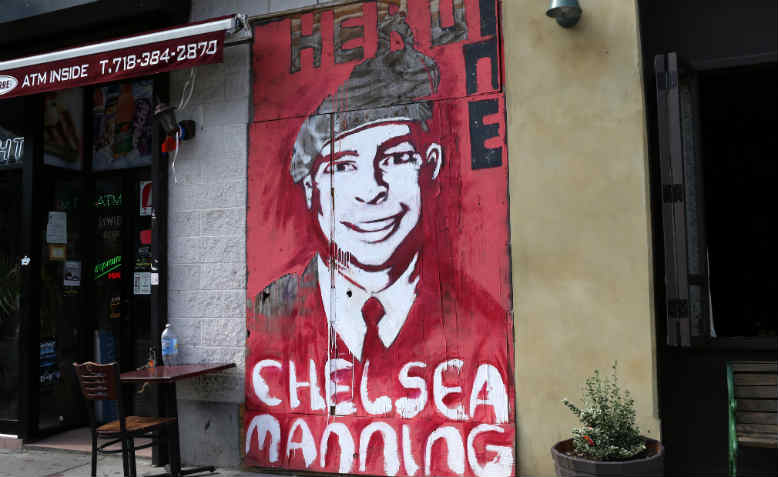 Chelsea Manning mural. Photo: Flickr/Timothy Krause
Chelsea Manning mural. Photo: Flickr/Timothy Krause
The government doesn’t think the governed need to know what it’s doing, and it has new plans to keep it that way argues Kara Bryan
The government plans to radically overhaul the Official Secrets Acts, cracking down on whistleblowers and journalists sharing state secrets in the public interest. A new report commissioned by the Cabinet Office significantly tightens existing legislation protecting classified information from unauthorised disclosure.
New measures will make it easier to secure a conviction, increase sentences, remove the burden of proof establishing ‘damage’ to national security and will abolish the defence of ‘public interest.’
This deliberately hinders legitimate scrutiny of government wrongdoing, and wholly undermines the fourth estate’s role as public watchdog. The implications for press freedom are alarming.
Under sweeping new proposals, civil servants who leak classified information could now be jailed for up to 14 years, placing whistleblowers on a par with spies engaged in espionage for a foreign power. Currently the maximum term for is 2 years.
Extending the definition of ‘espionage’ to include obtaining sensitive information, journalists could face prosecution and potentially incarceration for merely handling sensitive documents. Foreign nationals who leak classified material overseas could also be prosecuted in the UK for the first time.
The new measures would see the Official Secrets Acts of 1911, 1920 and 1939 redrafted to form a new, all encompassing ‘Espionage Act’ and the Official Secrets Act 1989 would be replaced by a data disclosure law amid concerns that the Act is out of step with advances in digital technology.
The open public consultation will run until April 3rdbut media organisations and civil rights groups have already expressed concerns about the implications on press freedom and human rights, and have expressed frustration with the consultation process.
The Law Commission, who drafted the report, claims to have consulted with media and human rights organisations but civil rights group Liberty issued a statement to the effect that they did not consider themselves to have been properly consulted. And they are not alone. Several other NGOs named on the consultation paper have also expressed dissatisfaction and questioned the legitimacy of the consultation process, in which, human rights lawyers, journalists and former whistleblowers have all been bypassed.
Former Guardian editor Alan Rusbridger expressed concern that the proposals had been set out without any ‘proper consultation’ and described the measures as ‘alarming.’
A spokesperson for the Guardian described the proposals as a ‘full-frontal attack’ and confirmed that they had held only one preliminary meeting with the government’s legal advisors but had been named in the consultation paper anyway, and said, “The proposals to threaten journalists and whistleblowers with draconian punishment, combined with powers just introduced in the Investigatory Powers Act to surveil journalists without their knowledge, represents a further attack on freedom of expression.”
Whistleblowers perform a vital function exposing government wrongdoing, corruption and human rights abuses. Edward Snowden exposed the unwarranted and illegalcollection of metadata and blanket surveillance by the NSA and GCHQ for seven years, without whose courage at great personal risk, we would be oblivious to the extent of government snooping.
Wikileaks have, for more than a decade, provided thousands of cables and field reports; documented evidence of torture, paramilitary death squads, drone strikes, corruption and government complicity in war crimes and interference in the democracy of sovereign nations. It’s founder Julian Assange has spent more than 6 years under house arrest whilst seeking refuge in the Ecuadorian embassy.
Former spy Annie Machon exposed the crimes perpetrated by MI5 and the botched assassination attempt on the life of a sovereign leader. Former ambassador Craig Murray resigned in defence of his opposition to torture and extraordinary rendition and Chelsea Manning has spent more than 7 years in incarceration for leaking over quarter of a million sensitive diplomatic documents to Wikileaks and the now infamous ‘Collateral Murder’ video, showing the indiscriminate murder of over a dozen Iraqi civilians.
Spying on and threatening journalists with incarceration for performing their role as public watchdog is the sort of repression one associates with authoritarian regimes, supposedly practices shunned in 21stcentury Britain.
The powers granted by the Investigatory Powers Act together with the proposed measures to remove of the burden of proof establishing damage to national security and the abolition of the defence of ‘public interest’ represents a vociferous multi-pronged attack on freedom of expression.
According to the Law Commission, ‘Such a defence would allow someone to disclose information with potentially very damaging consequences. The person making the unauthorised disclosure is not best placed to make decisions about national security and the public interest.’ While governments are not expected to sanction the unauthorised disclosure of their most closely guarded secrets, the catch-all explanation of ‘national security’ is grossly inadequate and provides blanket cover for tyranny, oppression and a catalogue of abuse.
The proposals set in motion by the Law Commission are the stuff of dystopian fantasy and would to render it impossible to expose government wrongdoing or encourage whistleblowers from speaking out. Former SAS soldier and whistleblower Ben Griffin of campaign group Veterans for Peace said, “The British government… is deliberately misleading the public. [It] is no surprise they have decided to clamp down on whistleblowers.”
Writing in the Guardian, shadow Attorney General and former director of human rights’ group Liberty, Shami Chakrabarti urged the public to get involved in the consultation process.
Sometimes the reaction whistleblowers’ revelations is depressingly muted. Sometimes there is public outcry. And sometimes they may even act as a catalyst for revolution, but without a free press speaking truth to power, our democracy is hopelessly compromised. After all isn’t the Government’s motto, ‘if you have nothing to hide, you have nothing to fear.’

